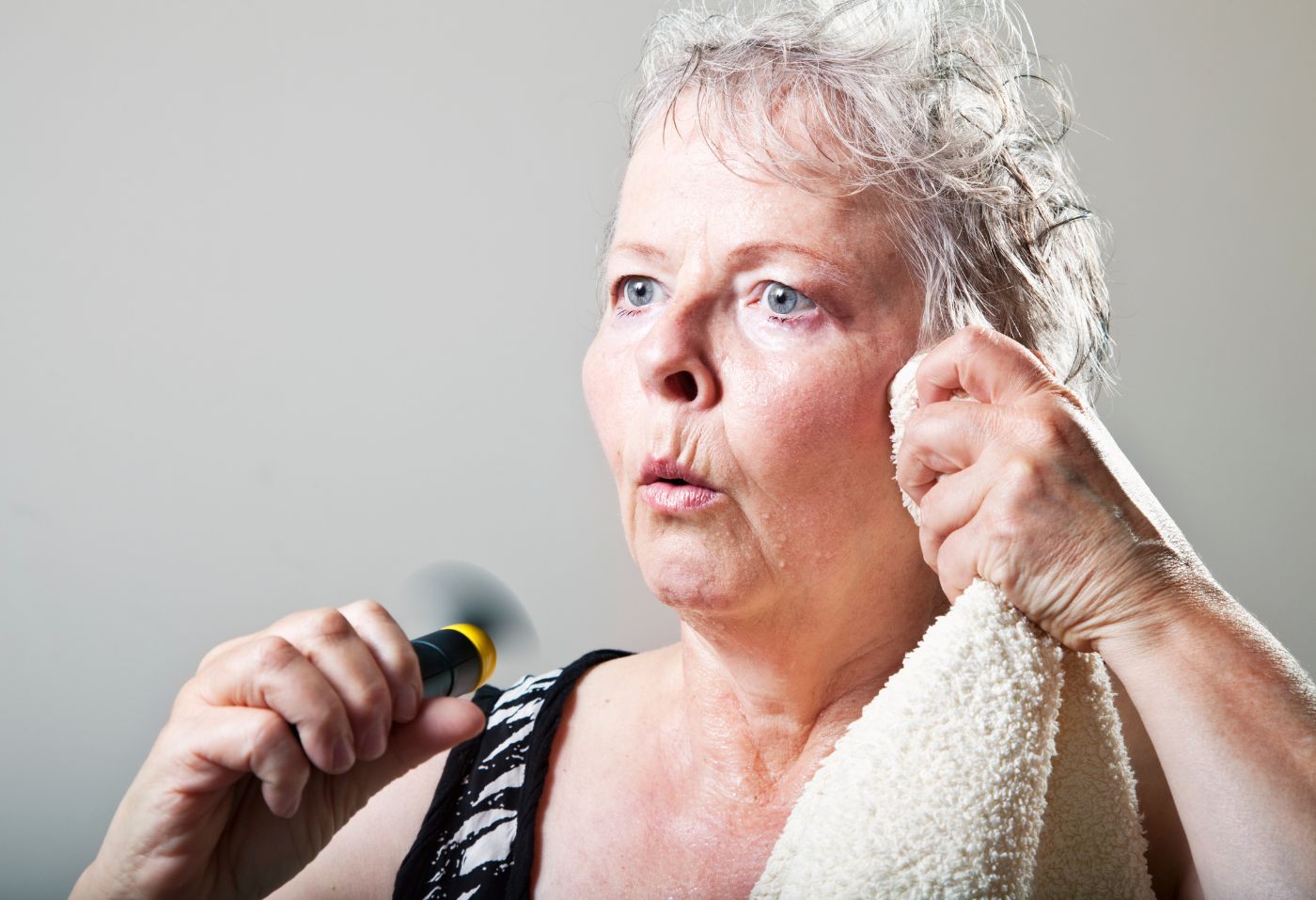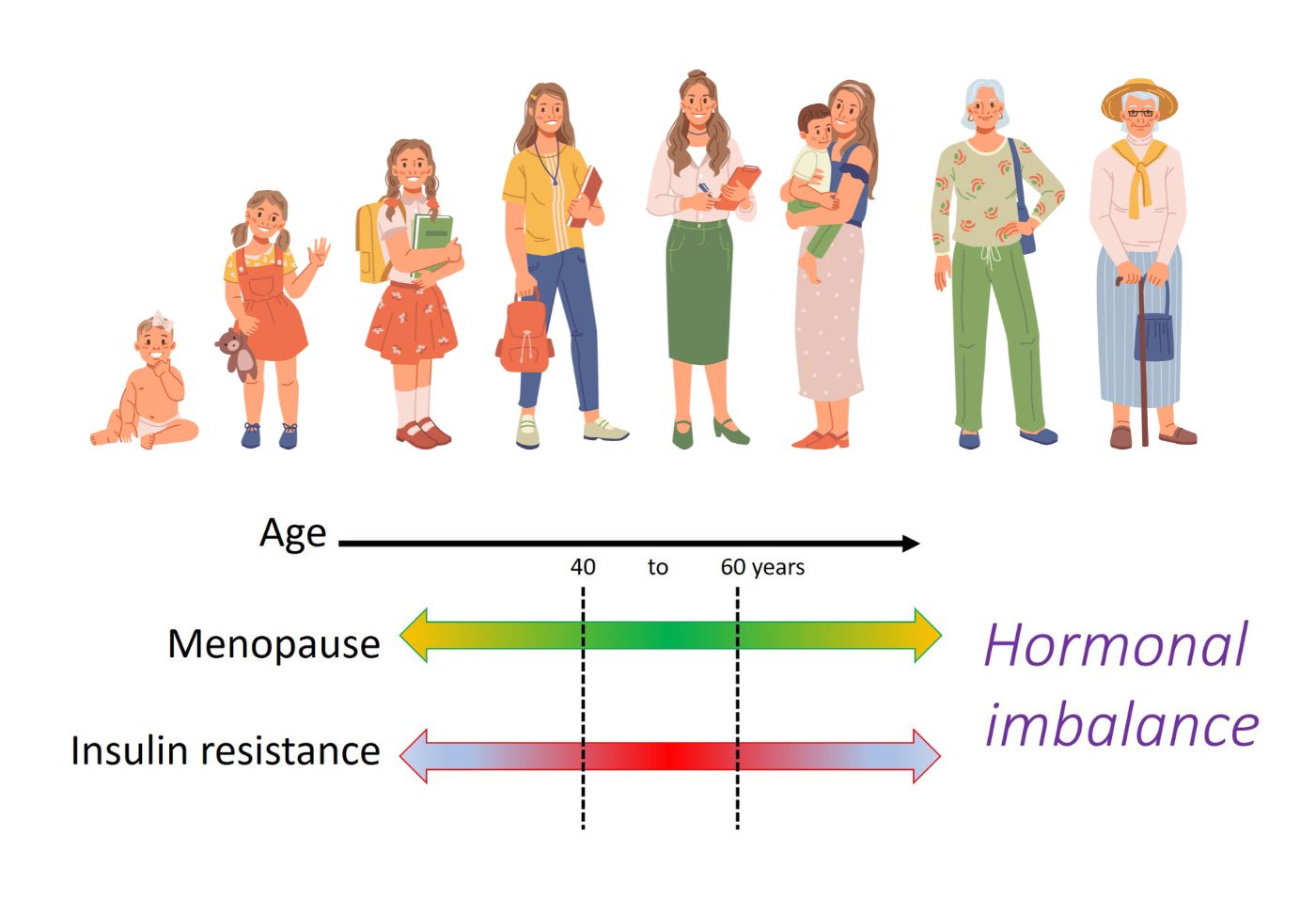Low Carb and Menopause

Written by Dr Estrelita van Rensburg
Introduction – Menopause
Menopause is the time that marks the end of menstrual cycles. This transition period most often begins between ages 45 and 55. It usually lasts about seven years but some can experience symptoms for as long as 14 years.
Whilst many women experience symptoms during this time, the degree of symptoms and duration vary greatly. Some women hardly experience any symptoms, while others suffer from hot flashes, weight gain etc that may require treatment.
There are undoubtedly different factors impacting the severity of symptoms including lifestyle factors such as smoking, diet, race and ethnicity. We will explore reasons why women have different experiences across the globe.

While hot flashes and night sweats are unquestionably some of the most common menopause symptoms, it is not always linked to other psychological or physical ones.
A case in point are symptoms such as depression, headaches, irritability, mood swings, increased body weight and memory loss, which are equally shared among both sexes. For this reason, many feel that these symptoms (excluding hot flashes and other female specific issues) should be more accurately portrayed as ‘aging' symptoms.
Western culture and menopause
In many western societies getting old is often feared. Consequently, many people try to feel and appear young for as long as possible.
Older women, especially menopausal women, in particular feel that they are undervalued members of society, especially since they have lost their ability to bear children. With their purpose in life diminished, they feel powerless and sometimes invisible.
It is true that patriarchal attitudes towards women in western societies have greatly improved over the past decades. Yet on the whole, the position of women in business and society in general is still not on par with that of men.
Menopause in traditional societies
Traditional societies have a very different perspective on menopause. Remarkably, in these societies we find healthy women who barely experience symptoms of menopause at all. For them, it is a celebratory transition into a new season of their lives.
Not only do they achieve greater status and become revered members of their communities, they are seen as the repositors of information and wisdom.1
Some interesting examples:
- in northern Sudan, menopause is merely seen as another facet of growing older, bringing increased social power and respect;
- until recently there was no word in the Japanese language to describe hot flashes;
- traditional Mayan women do not seem to experience any of the typical menopausal symptoms. For them it is a time of newfound freedom and status by becoming spiritual leaders in their communities;
- the Cree women of Canada believe they must enter menopause to access their shamanic and healing powers;
- menopausal women of the Maori tribes in New Zealand and the Iroquois Indians in North America become community leaders with considerable power and status.
In these traditional societies, the diets they follow are consistent with that which they followed for thousands of years. When they become exposed to our modern Western diet, the symptoms and diseases they start to experience are the same that we experience.

Hormonal imbalance during menopause
We know that during perimenopause the production of female sex hormones (oestrogen and progesterone) varies greatly. However, a point that is frequently overlooked is that there is another hormone whose effects are frequently out of balance. This hormone is insulin, whose function is dominant when it comes to regulating our metabolism.
When insulin is out of balance (when insulin levels are high), its effects will dominate that of other hormones, including our sex hormones (oestrogen, progesterone and testosterone). Too much insulin inhibits oestrogen production.2 It negatively affects our metabolic state. This is true for both men and women.

Insulin, not oestrogen is dominant - balance hormones
A large percentage of menopausal and postmenopausal women experience increased levels of insulin. The condition is called hyperinsulinemia. This is an unhealthy situation and negatively impacts energy production and supply in our body. In short, our body has lost its insulin sensitivity.
On account of this, we begin to suffer from decreased energy levels, because our normal insulin function is affected. Low energy symptoms during menopause are often incorrectly attributed to the changes in our reproductive hormones.
Contrary to our beliefs, insulin is the hormone responsible for regulating our metabolism. The key here is to improve insulin function and insulin sensitivity.
This is not something we can do with prescription medication. Insulin primarily responds to the food that we crave and eat. The only way to affect a change (lower insulin levels in the body) is to change the type of food that we eat.
Hormone levels - consequences of high insulin levels
Under the influence of high insulin hormone levels, the body stores energy as fat. In this situation, women start gaining weight more easily, especially around their waist area where fat distribution and storage takes place. Our body mass index increases as we gain weight.
Moreover, the changes go further than only fat storage and weight gain. Women may also experience changes in their bones, joints and heart disease risk. If this condition doesn't change over time, our cardiovascular health will continue to deteriorate.
Causes of high insulin levels in menopause
The reason for high insulin levels has nothing to do with age but everything to do with diet. High insulin levels are particularly linked to eating a high carbohydrate and low fat diet, leading to high sugar levels. This type of diet is aka our standard Western diet.
People eating a lot of processed food and drink items (bread, biscuits, breakfast cereals, rice, pasta, fizzy drinks etc.) are significantly at risk. Many people follow this diet because they believe (incorrectly) that saturated fat is bad for us.
The amount of carbohydrates in these processed food products releases high blood sugar (glucose) levels in our bloodstream. This drives correspondingly high insulin levels that negatively impact our metabolism. In turn, it drives a process of sugar crashes and carbohydrate or sugar cravings that ultimately lead to insulin resistance.3
We need to understand that insulin resistance and cardiovascular disease are almost inseparable.
Heart disease and cardiovascular disease are umbrella terms for various conditions including high blood pressure (hypertension), arteriosclerosis and stroke. Furthermore, brain function and mood disturbances are also commonly affected by high insulin levels.
In addition, many other serious health issues may also become apparent, as the condition of insulin resistance worsens. In this situation one or more other chronic illnesses including diabetes, cancer, Alzheimer's dementia and heart disease, as mentioned above, may develop.
When we are insulin resistant, symptoms such as weight gain, mood changes, low energy etc may well hit before menopause and intensify over time. Women notice these symptoms as they approach menopause because their bodies can no longer deal with high amounts of carbohydrates and blood sugar levels.

Overlap in symptoms from menopause and insulin resistance
Control insulin levels first - increase insulin sensitivity
Unless your insulin metabolism is balanced and functioning well, you will never be able to effectively address weight management, reduce hot flashes, night sweats and other menopause symptoms.
When all our hormones are in balance with each other, they will function correctly and we will feel healthy. In order to achieve that, we need to get insulin levels down in the first instance. This means that our insulin sensitivity will increase.
Western diet and menopausal symptoms
Many women also unwittingly make their ‘menopausal' symptoms worse by trying to lose weight using a traditional calorie-counting, high carbohydrate and low fat diet.
This will only exacerbate the symptoms further because the driving force of high insulin (carbohydrates) is not addressed in any significant way. The only effective way to deal with this is to follow a low carb diet.
Low carb diets in themselves are not very effective unless we also address the low fat diet component of traditional diets.
Healthy fats found in natural animal and plant based foods are essential for our wellbeing - for normal brain function, supporting our immune system and many other essential functions.
Full fat dairy products (saturated fat) for example are needed to absorb fat soluble vitamins. This cannot be done if we consume low fat products. Fat is satiating - making us feel full after eating and helping to suppress other food cravings.
Effective control of menopause
Today, the main medical treatment for menopause is hormone replacement therapy. This treatment aims to replaces the hormones that are at low levels. Unfortunately, it does nothing to address high insulin levels, which can only be addressed by restricting our carb intake.
The only way to address the underlying condition of insulin resistance is by changing and making the correct dietary choices – restrict our carb intake, aka a low carbohydrate diet. This will stop or even reverse insulin resistance by bringing insulin levels down to normal.
Conclusion: change how you eat
On the positive side, we are in charge of our own destiny. We can adapt and change our attitude about food, stop our food cravings, decrease hunger by increasing our saturated fat intake and by really paying attention to what we eat.
Saturated fats found in animal protein products fall in the healthy fats category. Eating enough healthy fat will help stop the weight gain, especially the belly fat. It actually helps us with weight loss. It is good to remember that eating fat doesn't make us fat!
We can without a doubt influence the kind of menopause we experience. We may even see menopause as a transition to something new and positive, like other traditional cultures.
If you need help and guidance on how to implement a healthy eating program and decrease hunger, we can help. Our COURSES were specifically designed with this in mind.
References
- Menopause in different cultures. Women’s Health Network (online), July 2022. Menopause in Different Cultures - Women's Health Network (womenshealthnetwork.com)
- Bikman B. Why We Get Sick. Dallas: BenBella Books, 2020
- Van Rensburg E and Warrack I: Eat Well or Die Slowly: Your Guide to Metabolic Health, UK: Wellness EQ Publishers, 2020. https://bit.ly/EatWellorDieSlowly

